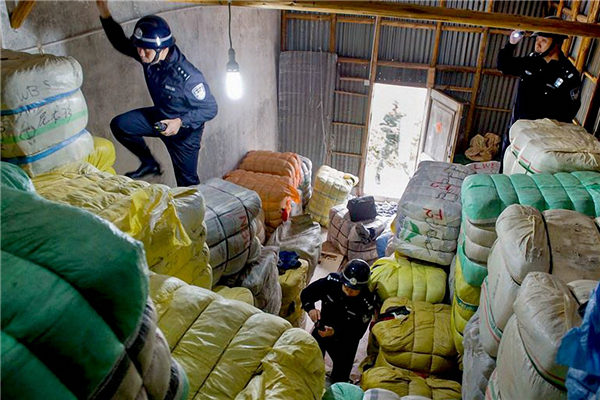
Law enforcement officers check a warehouse that was storing imported used clothes in Shantou, Guangdong province, in March. [Photo/Xinhua]
China will review companies that recycle imported solid waste. It’s one of several measures designed to reduce pollution generated by the processing of such waste, the top environmental authority said on Aug 22.
The five-month joint campaign, including environmental and customs authorities, will be launched soon, targeting companies that recycle imported electrical waste, tires, plastic and textiles, as well as those that dismantle broken household appliances, said Li Ganjie, minister of environmental protection.
The effort will shut down polluting recyclers, regulate processing zones and guide the green growth of domestic recycling companies. Some measures to ban the importation of solid waste will also be considered, the minister added.
Many companies that process imported solid waste were found to be severely contaminating the environment, making them a major target for environmental authorities.
In a monthlong inspection conducted by the Ministry of Environmental Protection since July 1, more than 1,700 inspectors have checked 1,792 imported waste processors, of which 60 percent were found to have various problems, such as excessive discharges of pollutants, said Liu Youbin, an official in the ministry’s publicity department.
Li, the minister, ordered local environmental authorities to take action against polluting processors.
The ministry will propose some amendments to laws and regulations to enhance fines on companies that smuggle solid waste and pollute the environment, Li said.
In addition, random inspections of companies involved in the importation of solid waste will be conducted, he said.
The central government approved an action plan in July to ban the importation of polluting garbage and improve domestic recycling industries. The plan is to be completed by 2019.
Since the 1980s, China has imported some solid waste-such as paper, plastics and some scrap metals-by calling them raw materials. But hazardous pollutants have been found mixed in.
The action plan “will serve green growth and environmental protection, and it will protect public health”, Li said.
Various authorities related to the management of imported solid waste-including commerce, environment and customs-will share information across their systems to strengthen monitoring, Li said.
